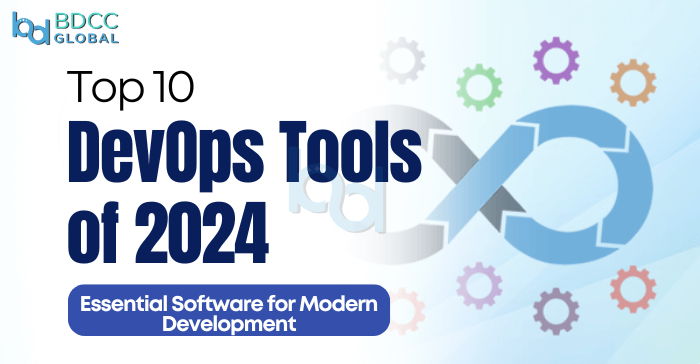
The DevOps landscape continues to evolve at a rapid pace, driving innovation in how organizations build, deploy, and manage their software. As 2024 unfolds, several tools have emerged as leaders in enhancing collaboration, automation, and efficiency across the development lifecycle. Below are the top DevOps tools for this year, providing essential capabilities to streamline your software delivery pipelines.
1. GitHub
Overview: GitHub remains a cornerstone for collaborative software development, providing powerful version control, project management, and CI/CD integration. It continues to be a popular choice among developers for managing code, enabling teams to work together seamlessly.
Key Features:
- Advanced code review tools
- GitHub Actions for CI/CD automation
- AI-assisted coding with GitHub Copilot to boost productivity
2. Jenkins
Overview: As one of the most popular open-source automation servers, Jenkins is widely used for continuous integration and delivery. Its vast plugin library allows for extensive customization, making it adaptable for various project requirements.
Key Features:
- Large plugin ecosystem for integrations
- Support for distributed builds
- Highly flexible with an active community for support
3. Docker
Overview: Docker continues to lead the containerization space, allowing developers to package applications and their dependencies into lightweight containers. This ensures consistent environments across development, testing, and production.
Key Features:
- Streamlined container creation and management
- Compatibility with both Linux and Windows environments
- Access to a rich public registry of pre-built images
4. Kubernetes
Overview: Kubernetes has established itself as the top tool for container orchestration, managing containerized applications at scale. Its capabilities extend to automated deployment, scaling, and maintenance of applications across multiple nodes.
Key Features:
- Self-healing and auto-scaling
- Rolling updates and rollback capabilities
- Strong ecosystem with third-party integrations
5. Ansible
Overview: Ansible is an agentless configuration management and automation tool that simplifies IT automation processes. Its simple, YAML-based language allows DevOps teams to manage configurations, automate tasks, and deploy applications efficiently.
Key Features:
- Agentless, reducing overhead
- Declarative, human-readable configurations
- Extensive module library for diverse use cases
6. Terraform
Overview: Terraform by HashiCorp is a leading infrastructure-as-code (IaC) tool that allows users to define and manage infrastructure using declarative configuration files. It supports a wide range of cloud providers and services, making infrastructure provisioning more efficient.
Key Features:
- Multi-cloud compatibility (AWS, Azure, GCP, etc.)
- Declarative configuration syntax
- Infrastructure versioning and modularity
7. Prometheus
Overview: Prometheus is a robust open-source solution for monitoring and alerting, particularly well-suited for cloud-native environments. Its flexible query language (PromQL) and integration with Kubernetes make it ideal for tracking metrics and performance.
Key Features:
- Powerful time-series database
- Built-in alerting with flexible rules
- Easy integration with Grafana for visualization
8. Grafana
Overview: Grafana provides an intuitive platform for monitoring and visualizing metrics from various data sources. Its customizable dashboards are widely used to track system health, performance metrics, and business KPIs.
Key Features:
- Multi-source data integrations (Prometheus, Elasticsearch, etc.)
- Real-time dashboards with rich visualization options
- Alerting and notification features for proactive monitoring
9. CircleCI
Overview: CircleCI is a continuous integration and continuous delivery (CI/CD) tool that simplifies automation of the software release process. It offers both cloud and on-premises options to suit various project needs, supporting fast and efficient delivery.
Key Features:
- Easy-to-use configuration with YAML files
- Support for a variety of programming languages and platforms
- Powerful API for custom workflows
10. GitLab
Overview: GitLab is a comprehensive DevOps platform that covers everything from source code management to continuous integration and security. It brings together version control, CI/CD, and project management in one cohesive solution.
Key Features:
- End-to-end DevOps lifecycle support
- Integrated security features for code scanning
- Highly customizable CI/CD pipelines
Conclusion
As the DevOps field continues to expand, adopting the right tools can significantly enhance your team’s productivity, streamline workflows, and improve the quality of software releases. These top 10 tools for 2024 represent a mix of tried-and-true solutions alongside innovative updates that keep pace with modern development practices.
By leveraging these tools, organizations can effectively bridge the gap between development and operations, automate tedious processes, and deliver software at a faster pace without compromising quality.
FAQ’s
What are the top DevOps tools to use in 2024?
The top DevOps tools of 2024 include GitHub, Jenkins, Docker, Kubernetes, Terraform, and Ansible. These tools enhance automation, streamline CI/CD processes, and support infrastructure management.
Why is Kubernetes so popular for DevOps in 2024?
Kubernetes has become the leading tool for container orchestration due to its robust capabilities in automating deployment, scaling, and managing containerized applications. Its self-healing and auto-scaling features make it ideal for cloud-native environments.
How does GitHub Copilot enhance developer productivity?
GitHub Copilot uses AI to assist developers by suggesting code snippets and entire functions, which accelerates coding, reduces errors, and allows teams to focus on solving complex problems rather than repetitive coding tasks.
What is the difference between Ansible and Terraform?
Ansible focuses on configuration management and automating tasks, making it great for deploying software and managing existing systems. Terraform, on the other hand, is an Infrastructure-as-Code (IaC) tool used to provision and manage cloud infrastructure, focusing on setting up infrastructure from scratch.
How does Docker help in software development?
Docker enables developers to package applications and their dependencies into portable containers, ensuring consistency across different environments. This reduces the “works on my machine” problem, making deployment more reliable and efficient.
Why is monitoring with Prometheus and Grafana important for DevOps?
Prometheus and Grafana work together to monitor application performance and system metrics in real time. Prometheus collects metrics and triggers alerts, while Grafana provides powerful visualizations and dashboards, helping teams identify issues before they impact users.
BDCC
Latest posts by BDCC (see all)
- Cloud computing in healthcare: Uses and benefits - June 23, 2025
- What are the Best Practices for Terraform File Structure? - June 10, 2025
- From Monolith to Microservices: DevOps Strategies For a Smooth Transition - June 5, 2025

